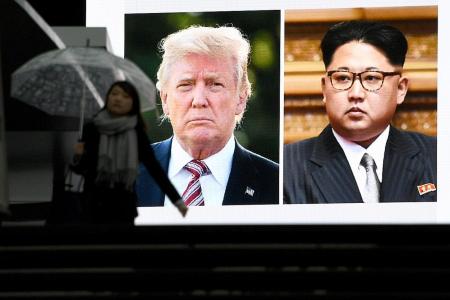The US is well placed to negotiate with North Korea
Meeting between Trump and Kim can help build up connective tissue of diplomacy, preventing war
Mr Donald Trump has unexpectedly agreed to become the first sitting US president to meet with a leader of North Korea.
The reaction has ranged from cautious optimism to warnings about the inexperience of the Trump administration to flat-out criticism. The criticisms are easily dispelled.
One objection is Mr Trump will "legitimise" North Korea. However, Washington already recognises North Korea as a nation state.
The US has negotiated with Pyongyang over almost seven decades, from talks at the Demilitarised Zone to meetings among diplomats in third countries and at the United Nations, to a visit to Pyongyang by the secretary of state in 2000, to quasi-diplomatic visits by former US presidents Bill Clinton and Jimmy Carter.
North Korea is already a nuclear power, whether anyone likes that or not. The criteria for "legitimacy" appear long met with or without M r Trump.
The State Department is gutted, said some people. The US has no ambassador to South Korea. The Special Representative for North Korea Policy just retired. But it is disingenuous to claim there is no one left to negotiate with Pyongyang simply because their names are unfamiliar.
Mr Marc Knapper, the current Charge d'Affaires at the US Embassy in Seoul, has more than 20 years of Korea experience, including as deputy chief of mission in Seoul. He has been to North Korea multiple times and is trusted by South Korea.
His Minister-Counsellor for Political Affairs Edwin Sagurton has also spent years on the peninsula and worked in the North.
A third senior American official, Busan Consul Dae B. Kim, was born in Seoul and has worked on Korean issues for some 20 years. He served alongside US secretary of state Madeleine Albright during her visit to Pyongyang.
The three diplomats speak Korean.
In Washington, the retirement of Special Representative Joe Yun is a loss, but acting in his capacity is his deputy Mark Lambert. Mr Lambert, too, has significant Korea knowledge, including having negotiated with the North as special envoy for the Six-Party Talks on North Korea's nuclear programme.
There are similar decades of Korean expertise at the National Security Council, the Central Intelligence Agency, in the military and among South Korean diplomats to support Mr Trump's efforts.
Preparation? These men and women have spent their whole careers preparing.
Another criticism: It is wrong to start with a summit; Mr Trump already gave away the big prize.
This argument was old back when it was used to criticise Mr Richard Nixon for his "opening" of China visit in 1972. In the case of North Korea, the idea of holding lower-level talks leading up to a triumphant meeting between Mr Trump and Mr Kim Jong Un is a non-starter.
It is Mr Kim who sets the direction for North Korea's foreign relations, and it is important for him to signal this process move forward with his full approval.
It is unlikely North Korea's lower-level functionaries would be allowed to claim small victories on Mr Kim's behalf without his ceremonial leadership clearly demonstrated.
Previous US presidents have held off a summit pending progress, the result being that no real progress occurred over successive administrations.
North Korea is a top-down system (some say the same for Mr Trump's Washington) and needs to be dealt with as such.
The other reason to begin with a summit is there is little of the connective tissue of diplomacy existing between Washington and North Korea, the important mid-level contacts and relationships that could smooth over the logistics and details of preparation.
Both sides can also use the optics of a summit to empower diplomats such as the often embattled US Secretary of State Rex Tillerson.
A final criticism is the North Koreans are not serious about negotiations. Yet the North sent a clear signal of its seriousness by sending Mr Kim's sister, Ms Kim Yo Jong - a sign of his approval - and 90-year-old Kim Yong Nam - a sign of the inner circle's approval - to attend last month's Winter Olympics in the South.
Negotiations are not always an even give and take, and that is not a sign of weakness but of strength and skill. Success on the Korean peninsula, as in the Cold War, will be measured by the continued absence of war and the continued sense war is increasingly unlikely.
Those who criticise Mr Trump's plans to meet Mr Kim, and who pick at the edges of progress made, should remember diplomacy, the alternative to war, means meeting adversaries, not ignoring them. - REUTERS
The writer served in the US State Department for 24 years.
Get The New Paper on your phone with the free TNP app. Download from the Apple App Store or Google Play Store now



